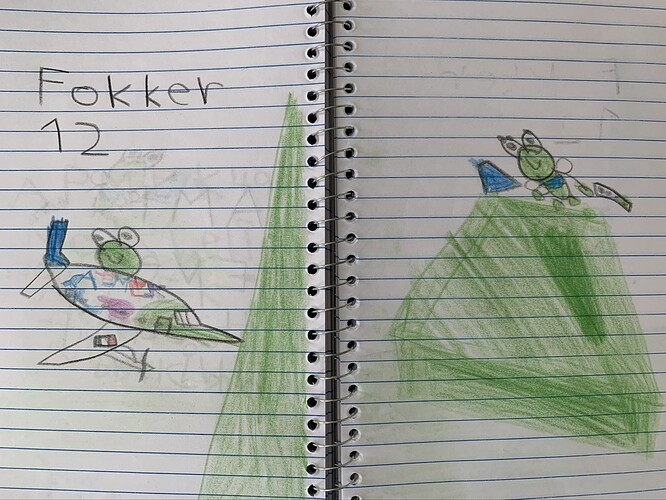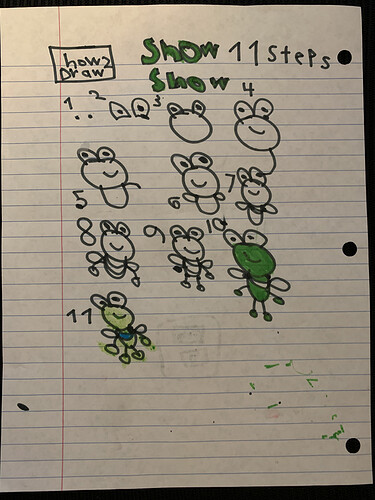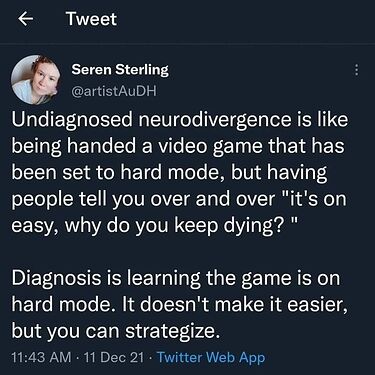Sure thing, Roethlisberger
One time in third grade my buddies and I realized we could turn our faces purple by holding down one spot on our necks. Teacher just looked at us like we were freaks. She wasn’t wrong.
I didn’t know I’d be able to find both in the same drawing, but I’m not surprised. Here’s Show Show contentedly piloting a plane into the side of a mountain and in the next frame happily strolling away from the wreckage.
You can see the vertical stabilizer there behind her. It’s a lot of fun getting him to say Fokker, let me tell you.
I found countless drawings of the character, some notable ones have her writing various Russian letters, a series that has her and a friend, I think it’s Cof Cof, making s’mores and then on another page she says Oh no, fat.
But I thought this tutorial would be nice to share just to get any interested party started drawing Show Show on their own.
This is fucking awesome. Thanks for sharing.
Outstanding! Show Show needs to be an animated series right away!
Also, I think that fokker might be a Messerschmitt.
…and now I see Limey’s got it covered already!
Missed this earlier. (It is haunting! No wonder suicides occur.)
When it comes to actually taking the time to LISTEN to someone else, rather than consumed/driven by our own thoughts, agendas, etc., I’m afraid we ALL have something akin to ADHD.
It seems to come down to learning to put someone else first…
TY, Ray!
Your catch up is very timely, as this is Mental Health Awareness week.
13. Masking
Well we’re coming back around to ADHD Awareness month again, so it’s time again for me to look inside my brain and offer up some insight beyond “I’m fine.” We say “I’m fine” because we don’t want to be honest about how we truly feel, either to that person or in that moment…or both. We all do it, and it’s called “masking”.
But for someone with ADHD, masking goes further; we do it to hide our neurodivergence.
Living with ADHD is one thing, but living with it not knowing you have it, is quite another. Let me clarify: it’s not that you don’t realize that you’re different. Sadly, you are very, seriously, deeply and acutely aware that there is something “wrong” with you. It’s just that you don’t know what it is or why you are that way.
The stereotype of ADHD is one of a kid running rampant in a grocery store, screaming and refusing to listen to his parents. As I explained in last year’s series of posts, that is only one presentation of ADHD, and it’s one of a kid who has not yet learned to mask their condition. The rest of us do not present our hyperactivity outwardly, but we ALL have it internally.
We’re like the Hulk, who is always angry but works to control his urge to turn into an enormous green rage-monster. That’s masking for an ADHDer, and it’s mentally and physically exhausting.
To us, masking means having to monitor everything you say and everything you do. Every word, every nuance, every look, every body movement is consciously evaluated for its weirdness factor and edited accordingly. Spontaneity is impossible. Authenticity is unreachable. Genuineness is unattainable. Everything is run through the algorithm to determine its “normalness”, so the world only gets to see a watered down, filtered, controlled and masked version of us.
To give you an idea of the effort required, think about how you feel at a job interview. It’s a state of being uber-controlled and tightly locked down; of analyzing your every response; of maintaining eye contact; of not fidgeting while still trying to come across as comfortable and natural. Doing all of this while still making sure to listen intently to the questions so you can provide appropriate responses. That’s how it feels mask your ADHD.
Now think about doing that 24/7…for 58+ years.
Of course, achieving a perfect mask is impossible. So as hard as we try, people will notice that something is off - most often these will be those people closest to us - and eventually they will not accept “I’m fine” as an answer. This is a terrifying moment. We have been busted, and now we have to answer a perfectly reasonable request for elaboration to which we do not have an answer, because we do not know the answer.
So we lie. We lie to spare the feelings of others. We lie to ourselves, thinking (hoping) that the excuse we are offering might actually be true, because then we’d have a chance of fixing it. We lie to survive.
But it’s not true, which means the lie won’t change anything, so we will be back here sooner or later when the old lie won’t fly anymore, compelled to offer up a new lie. Rinse, repeat. Until the audience won’t take it anymore.
Thank you Ray.
Looking forward to your insights again this year.
I have ADHD/ADD and hyperactivity. (Before my stroke. After my stroke, I have aphasia.)
14. Medication
I have touched on this subject in other posts, but I came across this video and it just does such a good job of explaining the impact of medication on us ADHDers.
The simultaneous joy and sorrow of what the medication does is something that I doubt many non-ADHD people could understand. It’s such a counterintuitive thing that the medication that alleviates - albeit temporarily - the symptoms of ADHD can cause such a negative emotional reaction, but it does.
The grief that comes from the realization of what could have been is deep and unrelenting. Every pill - usually two a day - is a reminder that you never got to be the person you could have been. You mourn the person you never got to be. It can cause you to wonder if you’d been better off not knowing, but the genie is out of the bottle now so, you’re still not in control of your brain, but in a whole new way.
And, of course, medication is not a cure. It allows us to be faux-neurotypical for the time after it kicks in until it fades out. The rest of the time, we are our natural ADHD selves.
Hi there, everyone. So, I’ll be on leave next week. I talked my way into attending a conference with my wife (a clinical psychotherapist) that is focused on neuroinclusion and the roles and strategies allistic therapists can employ to serve and support that community. So, there will be 40 or 50 therapists from around the world and me, a government tech executive. Ha. My main interest in attending is to continue to find ways to recruit, retain and increasingly make a more effective work experience/environment for my current and future neurodiverse colleagues. But, I am happy to ask questions that any of you might want answered from some of the academic and practitioner all stars in the business so, I’d be interested in any questions you’d like me to carry forward as I attend. The speakers are from US and European universities and non-profits focused on meeting the needs of the community, which they call “neuro-spicy” and spans the broader neurodiverse communities that are inclusive of autism, adult ADHD, bi-polar, schizophrenia and the like. All populations that I am interested in hiring, retaining, etc… Oh, and, if you are aware of any landmine or triggering topics y’all think I should not ask while I am there, I am all ears. My understanding for and affinity for this complex group is incomplete but maturing. Happy to share here anything I learn or hear while I am there (in Norway).
Should I spring for the FSD option on Elon’s brain chip?
Seriously…wow! I applaud your efforts to better understand the ND community. Our divergence doesn’t fit well in the 9-to-5, quarterly budgets world, but things like our ability to hyperfocus is a powerful weapon if deployed correctly. Or just the fact that everyone with AuADHD literally thinks differently.
That conference sounds fascinating, and I hope you come back with some interesting tidbits.
Where in Norway?
Tromso. 200 miles north of the Arctic Circle. In February. I am super excited. Going kayaking with orcas, feeding/riding behind reindeer, two aurora borealis viewing excursions, etc… I’m super excited.
Thanks for the props. On a hunch, I started recruiting from that (broad) community 3 or 4 years ago. It’s an absolute treasure trove of untapped talent. There are some human capital management challenges, for sure, but the benefits FAR OUTWEIGH those challenges. On a lark now that we are a few years in, I asked my team to run a report of the high performers in my org and those that categorized as neurodiverse made up 50% of the 4’s and 5’s in our performance evals while only making up 15% of the population. Incredible…
Have you watched Murder at the End of the World? You might want to avoid it until you get back.
Also, why TF would it be there? At this time of year?
Host it there in summer, when it will be daylight for 22 hours.
That’s awesome. Especially as all your ADHDers turned in their reports late. ![]()
That is so, so cool. I’ve been to Alaska and to the other polar region, but have never been that far North. Take some pics and share them someday.






